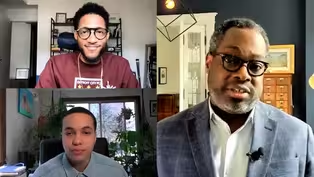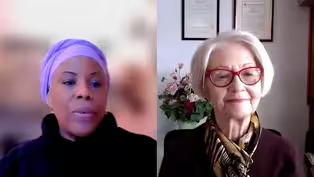
Remembering human rights activist, lawyer Randall Robinson
Clip: Season 51 Episode 14 | 3m 53sVideo has Closed Captions
Remembering the late human rights activist and lawyer Randall Robinson.
Proliferate human rights activist and lawyer Randall Robinson has passed away. He was 81 years old. In remembrance of the late Randall Robinson, “American Black Journal” reaches into the Detroit Public TV archives to play a clip of Robinson participating in a 1984 televised town hall on The State of Black America.
Problems playing video? | Closed Captioning Feedback
Problems playing video? | Closed Captioning Feedback
American Black Journal is a local public television program presented by Detroit PBS

Remembering human rights activist, lawyer Randall Robinson
Clip: Season 51 Episode 14 | 3m 53sVideo has Closed Captions
Proliferate human rights activist and lawyer Randall Robinson has passed away. He was 81 years old. In remembrance of the late Randall Robinson, “American Black Journal” reaches into the Detroit Public TV archives to play a clip of Robinson participating in a 1984 televised town hall on The State of Black America.
Problems playing video? | Closed Captioning Feedback
How to Watch American Black Journal
American Black Journal is available to stream on pbs.org and the free PBS App, available on iPhone, Apple TV, Android TV, Android smartphones, Amazon Fire TV, Amazon Fire Tablet, Roku, Samsung Smart TV, and Vizio.
Providing Support for PBS.org
Learn Moreabout PBS online sponsorship- Randall Robinson, you have spent a long time in Washington, on Capitol Hill, working with the Black Caucus.
Now as the head of a black lobbying organization, you have seen black people try to hold black politicians accountable.
Is it possible over the long haul?
Are blacks being successful at least in holding the Congressional Black Caucus accountable?
- Well, certainly in foreign policy.
The problem is not with the black politician.
The Congressional Black Caucus has demonstrated a tremendously increasing interest in foreign policy questions.
Black mayors and elected officials across the country have as well.
The problem is with the tradition of American policy towards the third world.
I was thinking as we were talking about Jesse's ascendancy being a sort of happy end of a continuum.
But when we look at American foreign policy in the Caribbean and Central America, in Southern Africa and Africa in general, in the Middle East, and across the globe, we see tragic results of a policy that is rested on the notion that the Soviet Union is responsible for everything that goes wrong in the world.
Whatever side the Soviets get on, the United States gets on the other side, so that one wonders if, at least once in this country's diplomacy, it will ever end up on the right social justice side of any issue.
And I think increasingly Americans are learning more about this, and the Congressional Black Caucus is taking a leadership role.
But much more has to be done.
I think the sophistication of black Americans must increase to a point where they know that our destinies are indissolubley tied to the destinies of those who struggle for freedom in Southern Africa, those who struggle in Cuba, (audience applauds) those who struggle in Haiti, those who struggle in Central America.
And we've got to separate, I think, the good from the bad.
When we look at a Central American policy that sees an invasion every three years for the last 150 years, whenever any country get cheeky with the United States, we simply march in and overthrow governments.
Has nothing to do with democracy, has nothing to do with social justice.
It has everything to do with countries practicing serious self-determination.
One takes a country like Cuba.
Blacks in Cuba make up 30% of the population.
They're doing enormously better than they did under Batista regime.
Infant mortality is lower than it is in the District of Columbia.
The lifespan has been increased from 59 to 72 years.
Yet Cuba's a government this administration and previous administrations have tried to strangle for the last 20 years.
But we prop up Haiti, and we prop up South Africa.
We are trying to finish Nicaragua.
We're trying to support a tremendously corrupt regime in El Salvador.
So that I think it behooves all of us to look behind at what we read in media in the United States to see how the people in these countries are faring.
Because for most of the people who live and struggle around the world, it's not a question of capitalism or communism.
It's a question of three-meals-a-day-ism, a question of a roof-over-my-head-ism.
An education, a place to go to school.
(audience applauds) I think we have to examine all of these things, but the problem is not with the black elected official.
The problem is with a tradition in the country that has ignored the plight of the dispossessed all across the third world.
Urban Consulate: In Session’ features Black changemakers
Video has Closed Captions
Clip: S51 Ep14 | 11m 33s | Urban Consulate launches a new video series titled “Urban Consulate: In Session. (11m 33s)
Violinist Regina Carter receives NEA Jazz Master Award
Video has Closed Captions
Clip: S51 Ep14 | 6m 19s | Violinist Regina Carter on receiving the NEA Jazz Master Fellowship Award. (6m 19s)
Providing Support for PBS.org
Learn Moreabout PBS online sponsorship
- News and Public Affairs

Top journalists deliver compelling original analysis of the hour's headlines.

- News and Public Affairs

FRONTLINE is investigative journalism that questions, explains and changes our world.












Support for PBS provided by:
American Black Journal is a local public television program presented by Detroit PBS

